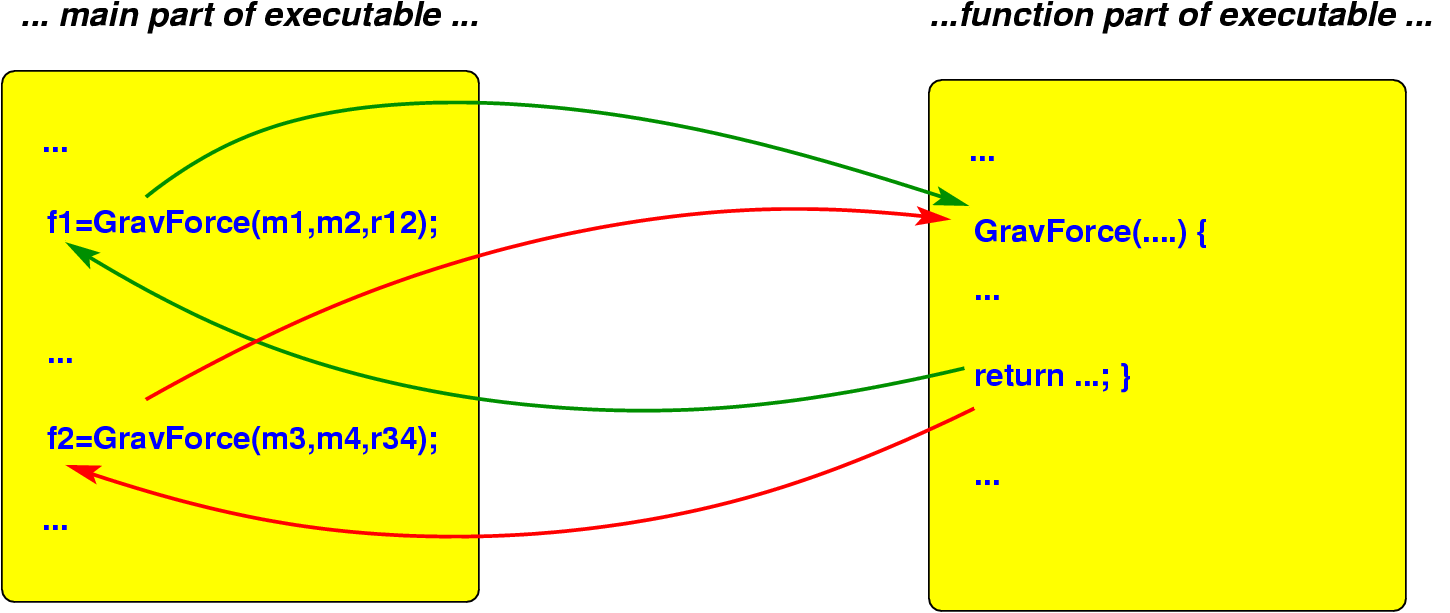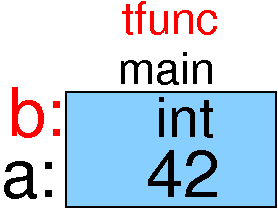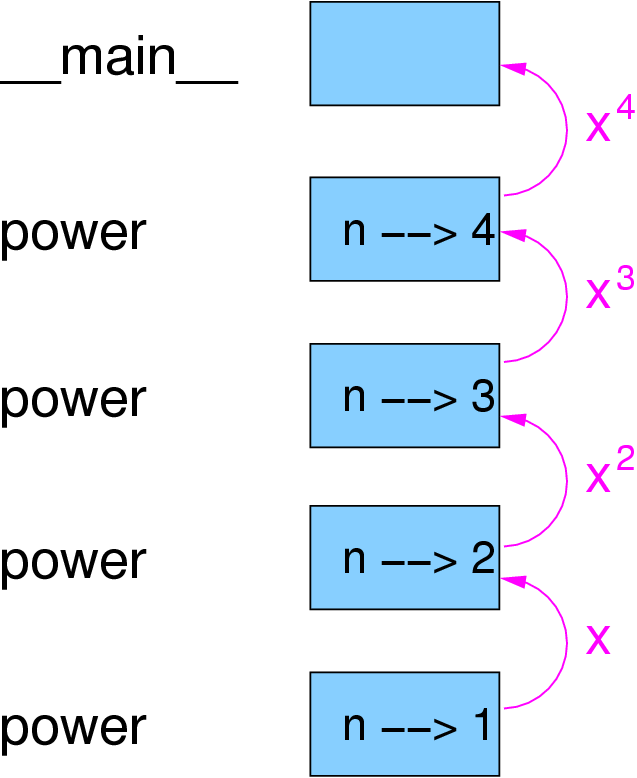Next: Gültigkeitsbereich von Variablen Up: C/C++ Grundlagen Previous: C++ 11/14/17/20
Einfaches Beispiel – Quadrat- und Kubikfunktion:
1 Argument wird an Funktionen
quadrat(..), kubik(..) übergeben,
Ergebnis (
double Wert) wird zurückgegeben.
double quadrat( double x ) // Berechne Quadrat
{
double r = x*x;
return r;
}
double kubik( double x ) // Berechne Kubik
{
double r = x * quadrat(x); // verwende quadrat funktion
return r;
}
int main()
{
double a1 = 2.5;
double a2 = quadrat(a1); // verwende Funktion
double a3 = kubik(a1);
// Argument kann auch komplexer Ausdruck sein ...
double b = quadrat( kubik(a3) * sin(0.8) + 0.99 );
}
double GravForce( double mass1, double mass2, double distance) // Kopf der Funktion
{
const double GRAV_CONST = 6.673 e-11; // Gravitationskonstante m^3 / ( kg s^2 )
double f = GRAV_CONST * mass1 * mass2 / (distance * distance);
return(f);
}
int main()
{
double mSonne = 1.9889e30, mErde = 5.974e24, dErdeSonne = 1.49597e11, rErde = 6.378e6;
// Aufruf von Funktion GravForce
double gErdeSonne = GravForce( mSonne, mErde, dErdeSonne ); // Kraft Sonne--Erde
double gPerson = GravForce( mErde, 80., rErde ); // Gewichtskraft 80 kg auf Erde
...
}

Programm–Design
void newline( ) // Funktion gibt nur neue Zeile aus
{ // keine Parameter-uebergabe
cout << endl; // keine Rueckgabe
}
int main()
{
newline();
}
int a = 42;
tfunc(a);
...
void tfunc(int b)
{...}

Nur für Spezialisten
int a = 42;
tfunc(& a);
...
void tfunc(int *b)
{...}

int a = 42;
tfunc(a);
...
void tfunc(int & b)
{...}

Hinweis: In fast allen Fällen würde ich letzteres Verfahren empfehlen,
d.h. Deklaration der Variablen in Funktion als Referenz:

#include <typeinfo>
#include <iostream>
#include <cmath>
using namespace std;
void tfunc1( double x);
void tfunc2( double *x);
void tfunc3( double & x);
int main()
{
double a = 3.14;
cout << "main start " << a << endl;
tfunc1( a );
cout << "main tfunc1 " << a << endl;
tfunc2( &a );
cout << "main tfunc2 " << a << endl;
tfunc3( a );
cout << "main tfunc3 " << a << endl;
}
void tfunc1( double x )
{ // x ist Kopie von a
x *=2;
cout << "tfunc1 " << x << endl;
}
void tfunc2( double * x )
{ // x ist pointer auf a
*x *= 2;
cout << "tfunc2 " << *x << endl;
}
void tfunc3( double & x )
{ // x ist identisch a
x *= 2;
cout << "tfunc3 " << x << endl;
}
Bei call-by-reference muss man eine weitere Komplikation beachten. Der Aufruf wie oben geht nur wenn echte Variablen (=l-value) als Argument übergeben werden, aber nicht bei temporären Variablen oder Zahlen (=r-value), dafür Übergabe als const reference nötig:
#include <iostream>
using namespace std;
void tfuncr1( double & x);
void tfuncr2( const double & x);
int main()
{
double a = 3.14;
tfuncr1( a ); // call ok
tfuncr1( 2.5 ); // error, cannot take number arg with ref
tfuncr1( 6*a ); // error, cannot take temp value arg with ref
tfuncr2( a ); // call ok
tfuncr2( 2.5 ); // ok, const guarantees value is not changed
tfuncr2( 6*a ); // ok, dto
}
void tfuncr1( double & x )
{
cout << "tfuncr1 " << x << endl;
}
void tfuncr2( const double & x )
{
cout << "tfuncr1 " << x << endl;
}
C++ ist eine sog. strong–typing Sprache, d.h.
Um Funktionen “bekanntzumachen” gibt es drei Möglichkeiten:
 Standardverfahren in C++:
Standardverfahren in C++:
// demo function overloading
// Deklaration Funktions Prototypen
void tfunc1( double x = 999); // deklariert tfunc1() und tfunc1( double )
void tfunc2( int x = -1); // deklariert tfunc2() und tfunc2( int )
void tfunc2( double x);
// void tfunc2( float x = 0.1); // illegal, tfunc2() schon deklariert
int main()
{
int a = 5;
int *b;
char *c = "ABC";
b = &a;
tfunc1( 1. );
tfunc1( 1 ); // int wird umgewandelt
tfunc1( a );
tfunc1( ); // default wird genommen
tfunc1( b ); // illegal, mit pointern geht die Umwandlung nicht
tfunc1( *c ); // Seltsam, aber char sind einfach Zahlen == tfunc(65)
tfunc2( 1 ); // int version wird benutzt
tfunc2( 1. ); // double version ""
tfunc2( ); // default darf nur einmal deklariert sein,
// in dem Fall also die int version.
}
// Definition/Implementierung der Funktionen
void tfunc1( double x )
{
cout << "tfunc1 " << x << endl;
}
void tfunc2( int x )
{
cout << "tfunc2 int " << x << endl;
}
void tfunc2( double x )
{
cout << "tfunc2 double " << x << endl;
}
double power( double x, int n )
{
if ( n > 1 ) {
return( x * power(x, n-1) ); // rekursiver Aufruf
}
else {
return( x );
}
}
double y = power( x, 4 );

Manchmal möchte man nicht nur einzelnen Wert (oder vector) zurückgeben, sondern Kombination verschiedener Werte.
Mit
std::tuple lässt sich das in modernem C++ relativ leicht erreichen.
Praktisches Beispiel: Nullstellen der quadratischen Gleichung – je nach Parametern gibt es 0, 1, oder 2 reele Nullstellen
#include <tuple>
#include <cmath>
#include <iostream>
using namespace std;
std::tuple<int,double,double> qg_root(double A, double B, double C)
{
// Returns (0, 1, or 2) real roots of
// the quadratic equation A*x*x + B*x + C = 0.
std::tuple<int,double,double> rval(0,0,0);
if ( A != 0 ) {
double disc = B*B - 4*A*C;
if (disc == 0) {
get<0>(rval) = 1;
get<1>(rval) = -B / (2*A);
}
else if ( disc > 0 ) {
get<0>(rval) = 2;
get<1>(rval) = (-B + sqrt(disc)) / (2*A);
get<2>(rval) = (-B - sqrt(disc)) / (2*A);
}
}
return rval;
}
int main() // function definition
{
auto r = qg_root( 1, 2, -1 );
cout << get<0>(r) << ", " << get<1>(r) << ", " <<get<2>(r) << endl;
}
sind "anonyme" Funktionen, sehr praktisch als Argument bei Aufruf von anderen Funktionen, z.B. STL Algorithmen die Funktion-Objekt bzw. Functor als Argument erwarten:
// lambda function example
vector <double> vec2 = { 1.2, 3.7, -2.6, 0.9, -7.1 };
// we want sort vector elements according to abs of value
// -- lambda funktion as 3. Argument
sort(vec2.begin(), vec2.end(), [](double x, double y) { return abs(x)<abs(y);} );
// equivalent with explicit function
bool chkabs(double x, double y) {
return abs(x)<abs(y);
}
sort(vec2.begin(), vec2.end(), chkabs );